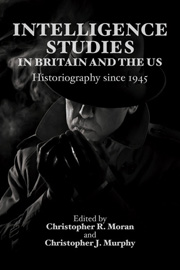Book contents
- Frontmatter
- Contents
- The Editors
- The Contributors
- List of Figures
- Preface
- Acknowledgements
- Introduction: Intelligence Studies Now and Then
- Part I AMERICAN INTELLIGENCE HISTORIOGRAPHY
- Part II BRITISH INTELLIGENCE HISTORIOGRAPHY
- 9 A Plain Tale of Pundits, Players and Professionals: The Historiography of the Great Game
- 10 No Cloaks, No Daggers: The Historiography of British Military Intelligence
- 11 The Study of Interrogation: A Focus on Torture, But What About the Intelligence?
- 12 Whitehall, Intelligence and Official History: Editing SOE in France
- 13 A Tale of Torture? Alexander Scotland, The London Cage and Post-War British Secrecy
- 14 1968 – ‘A Year to Remember’ for the Study of British Intelligence?
- 15 Their Trade is Treachery: A Retrospective
- 16 Intelligence and ‘Official History’
- Index
14 - 1968 – ‘A Year to Remember’ for the Study of British Intelligence?
from Part II - BRITISH INTELLIGENCE HISTORIOGRAPHY
Published online by Cambridge University Press: 05 October 2013
- Frontmatter
- Contents
- The Editors
- The Contributors
- List of Figures
- Preface
- Acknowledgements
- Introduction: Intelligence Studies Now and Then
- Part I AMERICAN INTELLIGENCE HISTORIOGRAPHY
- Part II BRITISH INTELLIGENCE HISTORIOGRAPHY
- 9 A Plain Tale of Pundits, Players and Professionals: The Historiography of the Great Game
- 10 No Cloaks, No Daggers: The Historiography of British Military Intelligence
- 11 The Study of Interrogation: A Focus on Torture, But What About the Intelligence?
- 12 Whitehall, Intelligence and Official History: Editing SOE in France
- 13 A Tale of Torture? Alexander Scotland, The London Cage and Post-War British Secrecy
- 14 1968 – ‘A Year to Remember’ for the Study of British Intelligence?
- 15 Their Trade is Treachery: A Retrospective
- 16 Intelligence and ‘Official History’
- Index
Summary
Nineteen-sixty-eight was a momentous year for a multitude of reasons. In the wider context of the Cold War, the ‘Prague Spring’ was underway in Eastern Europe, whilst the war in Vietnam was gathering an ugly momentum. Both Martin Luther King and Robert ‘Bobby’ Kennedy were assassinated.
Albeit mixed, uneven and occurring on incremental bases, in the context of British intelligence, trends towards a greater degree of ‘liberalisation’ were gradually emerging. As scholar Richard J. Aldrich has argued vis-à-vis the world of intelligence and amid various political propaganda battles: ‘Secret service exploits were emerging as one of the most eye-catching variants of the Cold War story and each side wished to be seen as ahead in this clandestine war’. Among many activities conducted by intelligence communities, a forward lead in helping to shape overall narratives, extending to wider discourses, was adopted. Aldrich continued: ‘Accordingly, the 1960s were peppered with authorised memoirs by veterans of secret service’. And the year 1968 was no exception.
On closer examination, 1968 stands out as a significant year for the study of British intelligence. Significantly, a revised second edition of M. R. D. Foot's ‘classic study’, SOE in France (1966), appeared – in essence, refining a text which can be regarded as forming the first overt ‘“official history” in all but name’ of a British secret service (the Second World War era Special Operations Executive). Also significant were two other intelligence books.
- Type
- Chapter
- Information
- Intelligence Studies in Britain and the USHistoriography since 1945, pp. 263 - 280Publisher: Edinburgh University PressPrint publication year: 2013



